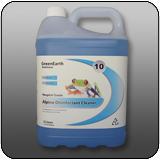Disinfectants
All of us want to have a clean home and a safe place for our family, right? We also want to be safe when we go to places like hospitals or office buildings or when we conduct our business.
Ever been curious as to how we manage to keep those places hygienic? It’s not something we often ponder upon and yet, it’s important to know how the substances we use function and what’s in them.
For instance, many have the misconception that soaps and detergents disinfect which they don’t - they help remove surface organic debris, and you should always rinse them off completely before disinfecting.
What actual disinfectants do, is they rapidly kill bacteria and fungi on surfaces, floors and non-living objects. They are chemical substances, which means that by nature they are potentially harmful to us, so make sure you always read and follow the safety instructions they come with!
There are many types of disinfectants on the market like alcohols, air disinfectants, aldehydes, bleaches and iodine. They have different applications – for instance, some are widely used in medical treatment centers in order to prevent the spread of bacteria.
The most common one you’ve probably heard of is chlorine, which is used to disinfect swimming pools, and is also added to drinking water to reduce waterborne diseases (don’t worry – only in small quantities!).
The use of disinfectants is only one step in taking good care of our work and home environments – germs and bacteria are on things that we touch every day, and can be easily transmitted! If we use our kitchen counters or sinks to prepare food, for example, we should disinfect or sanitize those areas. Not to mention it helps decrease the possibility of contracting an infection if we have a family member who is more susceptible to it.
You’re more than welcome to check out our own collection of disinfectants for your business or home area!
http://www.insinc.co.nz/disinfectantsandsantisersforcleaning.html
Posted: Tuesday 12 January 2016


